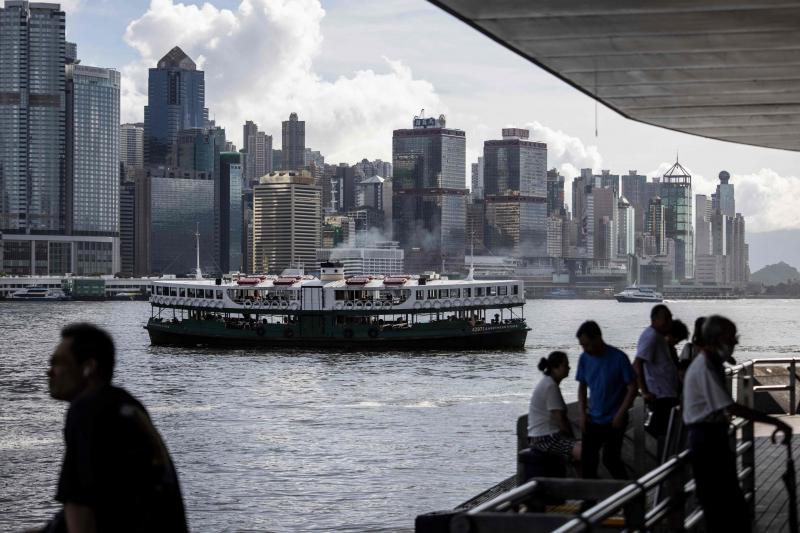Hong Kong’s economy grew faster than expected in the second quarter, pointing to some stability in key sectors despite challenges in real estate and retail.
GDP expanded 3.3 percent in the three months ended June from the prior year, according to advance estimates from the Census and Statistics Department yesterday. That’s higher than a median estimate of 2.7 percent and exceeded even the most bullish forecast among economists surveyed by Bloomberg News.
The data signals resilience in the region’s financial hub after several years of pressure from the COVID-19 pandemic and high borrowing costs. Increasing trade and capital flows from mainland China into the city have helped buoy growth so far this year.

Photo: Isaac Lawrence, AFP
The better-than-expected uptick may help the government achieve its full-year growth target of 2.5 percent to 3.5 percent. It followed strong first-quarter expansion that was revised up to 2.8 percent from 2.7 percent.
Exports grew at a double-digit pace for the last three straight months, driven by strong global demand. But the outlook remains challenged by the real estate sector downturn and a slowing economy in China, the city’s largest trading partner.
“The economy should continue to grow in the remainder of the year, but performance of the different economic segments may vary amid uncertainties on various fronts,” a government spokesperson said in a statement. The person cited geopolitical tensions, trade conflicts and US interest rate trajectory as potential headwinds.
Hong Kong’s economy is one of the slowest growing in the region. Analysts surveyed by Bloomberg expect growth will dip to a 2.7 percent pace this year from 3.3 percent last year, the only developed economy in Asia forecast to slow except Japan.
On a quarterly basis, GDP expanded 0.4 percent from the first quarter, according to the statement.
Goods exports and imports of services rose the most among GDP components from the prior year. Fixed capital formation, a category that includes the total value of investment spending, also increased at a faster pace.
Private consumption fell in the quarter for the first time since the third quarter of 2022. Spending has been restrained by a strong currency, pegged to the US dollar, and weaker sentiment. The government said the changes in spending habits of locals and tourists and the strong Hong Kong dollar “may continue to pose challenges.”
Real estate has been a particular sore spot, as demand remains weak with higher mortgage rates. Residential property prices have fallen to their lowest since 2016, increasing the risk of homebuyers finding themselves under water on loans. Office buildings are finding it difficult to attract tenants.
The dour mood and more frugal tourists have also kept a lid on retail spending, with sales falling for a third straight month in May, the longest streak since 2021. Many locals also spend across the border in Shenzhen and other mainland cities where goods and services tend to be cheaper.

MULTIFACETED: A task force has analyzed possible scenarios and created responses to assist domestic industries in dealing with US tariffs, the economics minister said The Executive Yuan is tomorrow to announce countermeasures to US President Donald Trump’s planned reciprocal tariffs, although the details of the plan would not be made public until Monday next week, Minister of Economic Affairs J.W. Kuo (郭智輝) said yesterday. The Cabinet established an economic and trade task force in November last year to deal with US trade and tariff related issues, Kuo told reporters outside the legislature in Taipei. The task force has been analyzing and evaluating all kinds of scenarios to identify suitable responses and determine how best to assist domestic industries in managing the effects of Trump’s tariffs, he

TIGHT-LIPPED: UMC said it had no merger plans at the moment, after Nikkei Asia reported that the firm and GlobalFoundries were considering restarting merger talks United Microelectronics Corp (UMC, 聯電), the world’s No. 4 contract chipmaker, yesterday launched a new US$5 billion 12-inch chip factory in Singapore as part of its latest effort to diversify its manufacturing footprint amid growing geopolitical risks. The new factory, adjacent to UMC’s existing Singapore fab in the Pasir Res Wafer Fab Park, is scheduled to enter volume production next year, utilizing mature 22-nanometer and 28-nanometer process technologies, UMC said in a statement. The company plans to invest US$5 billion during the first phase of the new fab, which would have an installed capacity of 30,000 12-inch wafers per month, it said. The

Taiwan’s official purchasing managers’ index (PMI) last month rose 0.2 percentage points to 54.2, in a second consecutive month of expansion, thanks to front-loading demand intended to avoid potential US tariff hikes, the Chung-Hua Institution for Economic Research (CIER, 中華經濟研究院) said yesterday. While short-term demand appeared robust, uncertainties rose due to US President Donald Trump’s unpredictable trade policy, CIER president Lien Hsien-ming (連賢明) told a news conference in Taipei. Taiwan’s economy this year would be characterized by high-level fluctuations and the volatility would be wilder than most expect, Lien said Demand for electronics, particularly semiconductors, continues to benefit from US technology giants’ effort

‘SWASTICAR’: Tesla CEO Elon Musk’s close association with Donald Trump has prompted opponents to brand him a ‘Nazi’ and resulted in a dramatic drop in sales Demonstrators descended on Tesla Inc dealerships across the US, and in Europe and Canada on Saturday to protest company chief Elon Musk, who has amassed extraordinary power as a top adviser to US President Donald Trump. Waving signs with messages such as “Musk is stealing our money” and “Reclaim our country,” the protests largely took place peacefully following fiery episodes of vandalism on Tesla vehicles, dealerships and other facilities in recent weeks that US officials have denounced as terrorism. Hundreds rallied on Saturday outside the Tesla dealership in Manhattan. Some blasted Musk, the world’s richest man, while others demanded the shuttering of his